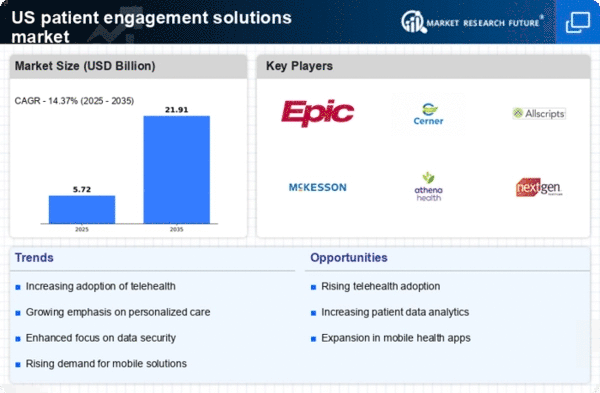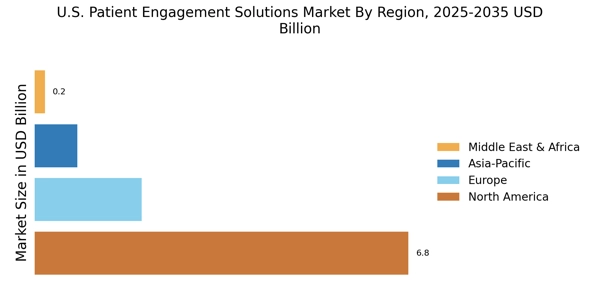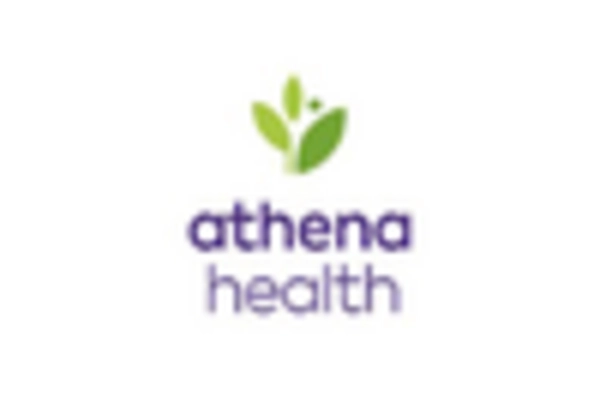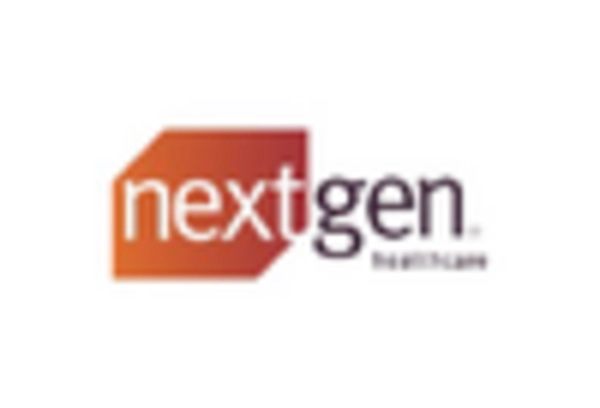Shift Towards Value-Based Care Models
The transition from fee-for-service to value-based care models is reshaping the patient engagement-solutions market. Value-based care emphasizes quality over quantity, incentivizing healthcare providers to engage patients actively in their care. This shift encourages the adoption of engagement solutions that enhance communication, education, and adherence to treatment plans. As healthcare organizations strive to meet value-based care metrics, the demand for effective patient engagement tools is expected to grow. This trend indicates a significant opportunity for the patient engagement-solutions market, as providers seek to improve patient outcomes while managing costs.
Increase in Chronic Disease Management
The rising prevalence of chronic diseases in the US is driving the demand for patient engagement-solutions. With chronic conditions affecting nearly 60% of adults, healthcare providers are seeking innovative ways to engage patients in their management. Effective engagement solutions can empower patients to take control of their health, leading to better outcomes and reduced healthcare costs. The patient engagement-solutions market is likely to expand as providers implement tools that facilitate self-management and education for patients with chronic diseases. This focus on chronic disease management underscores the critical role of patient engagement in improving health outcomes.
Technological Advancements in Healthcare
The patient engagement-solutions market is experiencing a surge due to rapid technological advancements in healthcare. Innovations such as mobile health applications, wearable devices, and artificial intelligence are enhancing patient interactions with healthcare providers. These technologies facilitate real-time communication, enabling patients to access their health information and engage in their care actively. According to recent data, the market for mobile health applications alone is projected to reach $100 billion by 2025, indicating a robust growth trajectory. This trend suggests that as technology continues to evolve, the patient engagement-solutions market will likely expand, driven by the demand for more interactive and personalized healthcare experiences.
Growing Emphasis on Patient-Centered Care
There is a notable shift towards patient-centered care in the US healthcare system, which is significantly impacting the patient engagement-solutions market. This approach prioritizes the needs and preferences of patients, fostering a collaborative environment between patients and providers. Research indicates that organizations implementing patient-centered strategies can improve patient satisfaction by up to 30%. As healthcare providers recognize the value of engaging patients in their care processes, the demand for effective engagement solutions is likely to increase. This trend suggests a promising outlook for the patient engagement-solutions market as it aligns with the broader movement towards enhancing patient experiences.
Regulatory Support for Patient Engagement
Regulatory bodies in the US are increasingly emphasizing the importance of patient engagement in healthcare delivery. Initiatives such as the 21st Century Cures Act promote the use of health information technology to enhance patient engagement. This regulatory support is likely to drive the adoption of patient engagement-solutions, as healthcare organizations seek to comply with new standards. The patient engagement-solutions market is expected to benefit from these regulations, which encourage transparency and patient involvement in their own care. As a result, healthcare providers are investing in solutions that align with regulatory requirements, further propelling market growth.


















